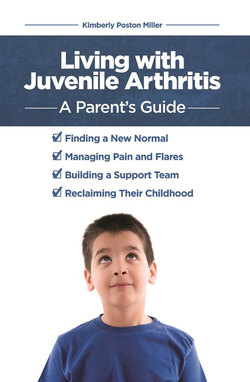Читать книгу Living with Juvenile Arthritis - Kimberly Poston Miller - Страница 7
На сайте Литреса книга снята с продажи.
ОглавлениеIntroduction
So your child has been diagnosed with juvenile arthritis. Now what? I know you may be feeling sad, angry, confused, and helpless. I remember those feelings well. I also remember wishing for a step-by-step instruction manual. Unfortunately, like most things in life, this diagnosis doesn’t come with directions. If you’re looking for a medical guide, you’ve come to the wrong place. However, if you’re looking for answers to some of the other tough questions faced by parents of children with juvenile arthritis (JA), I can help you find them.
I can help you because I’m one of you. I have two children diagnosed with different forms of JA, and although I’m not a doctor or nurse, I often joke about being a medical paraprofessional. Just ask my pediatrician! And, I guarantee that over the coming weeks, months, or even years, you’ll find yourself becoming one as well. Let me also assure you that you’ll do better than you think you can.
Although every case of JA is different, many of the issues are the same. I learned so much “the hard way,” which is why I decided to write this book. By sharing my family’s experiences with you, I hope I can help you avoid a few common mistakes, provide some much-needed support, and help you make peace with this diagnosis—in all aspects of your child’s life. My wish is that this book will guide you through those unknown and sometimes frightening days after diagnosis, as well as the long and twisty road ahead. I want to help you learn to deal with the medical community effectively, so you can build a good healthcare team and make sense of insurance issues. I want to give you the tools you need to soften the impact your child’s condition will have on family and friends and help you deal with the emotional roller coaster you will inevitably face. I want to teach you to create good social and educational opportunities for your children if circumstances become difficult. Most importantly, I want to help you lessen the toll this disease can have on your children—both the ones who are ill, and the ones who are not—because this diagnosis is a family affair.
As parents, we have many roles: teacher, chauffeur, chef, playmate, disciplinarian, and, of course, medical caregiver. Even with a child who has no chronic illness, you have been filling this important position and are more experienced than you think! Before any diagnosis, you were administering routine medical care. You’ve already performed basic first aid on bumps and scrapes, determined when a fever was too high, or when that cough was hanging on just a little too long. You’ve been the one to decide when it’s time to see the doctor or get outside care. When you have a child with a chronic illness, this role does not change, it just magnifies significantly.
Depending on the severity of your child’s case, you may find yourself administering injections or keeping track of multiple medications, sometimes feeling as though you have earned the credentials of an NCNA (Non-certified nurse’s aide). You will become the first to recognize subtle changes in your child’s health or condition and relay the “right” information to your child’s medical team. You are going to be the first point of care even with skilled doctors in your corner. In other words, you’ll be the bridge between your child and his or her medical care.
After the shock of the initial diagnosis wears off and you become more comfortable with the medical aspects, you’ll find that’s just the beginning. The other challenges you face as a parent become magnified as well—from balancing the needs of your marriage and other children, to special educational considerations, and adjustments to your day-today life. You will also take on some new roles, including makeshift social worker, surrogate pal, and head cheerleader for your child. It can be overwhelming.
A Game Plan
As a former National Football League (NFL) wife and mother of two athletic sons (yes, even with JA!), I have learned a lot from sports. As you can imagine, sports are huge in our home. We watch them, we play them, and they have shaped our frame of reference. Thanks to sports, I know the value of a good team, a great game plan, and an experienced coach. I have learned never to give up, despite the odds, and to adjust to ever-changing opponents. This lifestyle and these lessons have helped my family cope with the chronic illnesses faced by my children. I don’t claim to know all the rules (because they seem to change constantly), but I have learned a great deal over the last ten years that I hope to share with you.
The three most important things to remember are (1) you are not alone, (2) you can do this, and (3) you will be stronger for it. Now let me help you plan your strategy for this new “season” in your child’s life!
